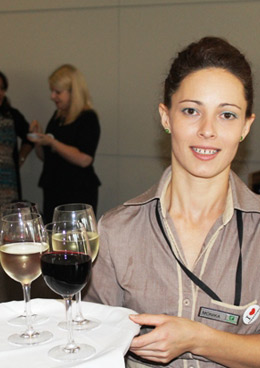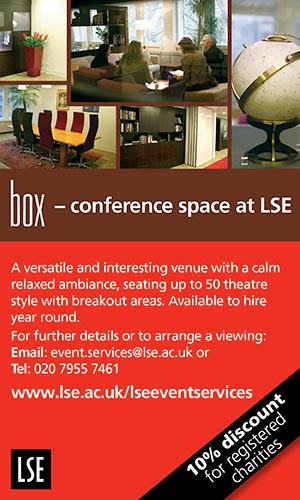Improving fundraising event performance
FROM THE EDITOR: This Special Feature is aimed at helping charities organise their fundraising events better. Of course, many charities are highly professional about the way they go about organising events and these can be very successful. Nevertheless the articles in the Special Feature are designed to help them take their events to the next level of success. For those charities where there is much to be improved upon there is crucial advice in the articles.
Richard Bartfield of Holiday Inn London explains how you can work smarter generally; John Baker of Aintree Racecourse wants you to think of using sporting venues; Sam Booth of Keele University focuses on conferences and training; Fay Sharpe of Zibrant advises on how to find the right venue for your gala dinner; Gary Peters of Evolve Events takes us to the gala fundraising night itself.
All our five experts stress the importance of planning and, as Gary Peters says: "The earlier you start to prepare, the better..." This Special Feature will help you with the content of your planning.
Click on the headlines of your choice.
Working smart with those connected to your event
Fundraising dinners can be the bread and butter of a big campaign or fundraising effort. They are a perfect launch pad, a way to give the campaign a big opening donation and make a real impact on donors. They are also excellent campaign closers – perhaps you are frustratingly close to the target and one final push is all that’s needed. In fact, fundraising dinners work rather excellently at every stage of a campaign.
To ensure success, however, careful planning and a tight control of costs are absolutely essential – or too much of that money will vanish in an ever increasing pile of bills. Catering is always a big part of these costs. Presumably your guests will have forked out in the hope of dining well, so securing a top notch menu at a knockdown price will really pay dividends (not to mention that the more "refreshed" guests are, the quicker those hands will fly up during the auction).
With this in mind below are some tips for charity event catering . . .
Ask, ask, ask
Not that you’ll need me to tell you this, but the key to any charitable event is, to put it bluntly, to be fairly shameless. Ask away, be cheeky and see what you can get away with. CSR (corporate social responsibility) makes for excellent PR and many businesses will be willing to help you out in return for a sponsor credit.
SUPPLIERS. Make a big deal of the fact the event is for charity, and make sure everyone knows. Ask for a cheaper venue rate, offer to compromise and see what they come back with. Bear in mind the simple facts such as Mondays and Tuesdays are much less popular than a Friday or Saturday and could be cheaper for you. (Your audience is likely to be committed and keen to turn out anyway!)
Very often venues have last minute cancellations and these can be worth snapping up as well. Don’t be afraid to lean on your caterer as well – perhaps they have some stock inching ever closer to its expiry date and will be willing to negotiate (also see below for more tips on menu planning).
VOLUNTEERS.When you are paying for cloakroom attendants, set-up and get-out teams, decorators, florists…etc… the list goes on and the wages bill mounts up. If you can rope in loyal supporters of the charity (free food and a glass of wine often does the trick!) you can cover some/all of these positions at no cost. Best of all, if they care about the charity they are likely to be highly motivated and make an excellent team.
SPONSORS. It goes without saying that the more you can cover your event costs the more money from ticket sales can go directly to the charity. Consider approaching corporate or local partners looking to win some CSR brownie points, or simply because they believe in what you’re doing. Ask your caterers if they have relationships with wine suppliers WHICH might be interested in helping you. (To be fair, nobody in hospitality can afford to support every charity event, so you will need to make a really strong case to get significant help.)
If you raise enough to cover all the costs then all the money from ticket sales can go to charity – a great sales pitch to donors, and a way to make them feel more generous at the table too.
Plan, plan, plan
Start early enough and you’ll be able to work with your suppliers to get the best deals; not to mention make sure your showpiece idea comes together seamlessly.
THE AIM. Who are you targeting, what is your target amount and how are you going to do it. Obvious and essential, though easily forgotten. Work this out, then make choices accordingly. If this is a local event with neighbours and friends in mind, the biggest ballroom in town with a five course tasting menu and matching fine wines, are probably not ideal.
Set the ticket price accordingly too – are you making most of your money on this, or is it the auction/raffle etc that is the real money spinner? The best bet is to make it relevant – do something quirky and relevant and you’ll catch people’s eye.
COMMUNICATE THE AIM. Tell your suppliers what you’re trying to do, then use their experience to your advantage. People in events like to be creative, draw them in and set the parameters (best to stress the budget) and see what they can come up with. Don’t surrender control, but make people feel actively involved and they’re likely to help you out more…shaving a few pounds here and there, and giving you more bang for your buck.
THE MENU. It’s essential your potential donors feel well treated. Keep them happy and they’ll keep the donations coming in. Sit down early in the process and talk to the chef. He or she is your best ally in your quest to maximise your profits at an event. They know what’s in season, what’s well priced and what just happens to be on that ultra-special offer from the suppliers at the moment – helping you make the most of what’s being spent.
Don’t be afraid to be a bit cheeky – if you really want to save, suggest you have a similar menu to the event before yours and ask to benefit from the economies of scale savings they’ll make!
ENTERTAIN YOUR GUESTS. Get the balance right here, and everything comes together. Keep guests topped up and make sure they’re having fun. Remember that the longer people stay at the event the longer they have to decide to donate more, and keep that total rising ever higher.
On the other hand it doesn’t always have to involve vintage champagne – ask your caterer to recommend cheaper options such as a good Prosecco or fun cocktail for the reception.
"ADD-ONS". These are to be used sparingly, but when appropriate consider what could be sold as an upgrade to the dinner package. There are lots of options – from extra champagne, deals for people who take a whole table, and a big ticket – the exclusive "meet and greet" with any celebrities – people are often happy to pay more when they feel they are getting just a little extra in return.
Keep asking
The Americans definitely have it right here – don’t forget the purpose of the event and keep on asking. Remember you’ve motivated people enough to get them here, now make sure you use this golden opportunity. Give a great a presentation about the charity, what it does and why the money is needed.
Raffles and auctions are fantastic ways to raise money (make sure all your suppliers, including the caterer, donate a prize!) and consider having a donations table in a prominent location. Above all, strike a balance, and let guests enjoy themselves but don’t let them forget why they’ve come.
All-in-all there is no "secret" to successful fundraising dinners. It really comes down to good planning and communication. Remember to talk to people and to be a bit cheeky – don’t let them forget it’s all for charity, and act like big discounts are the norm. Expect the best, but look for innovative ways to cost it efficiently.
Treat the caterers as part of your team, helping to meet the goal, and motivate them by ensuring they get their fair share of the glory for their effort. As with most things in life, you won’t get everything you ask for, but you should certainly be able to cut down some key costs to help meet those fundraising targets.
Sporting venues can offer charities a winning formula
When you bring charity volunteers, supporters and partners together for conferences or events it is vital to generate maximum impact. Every pound you spend on hospitality and relationship building is precious and there are few more inspiring or hard-working places to host your events than the world-class sporting venues we have in the UK.
Creating atmosphere
From the minute the invites are received, events at iconic venues begin working for your charity.
It sparks the imagination as recipients consider their own memories of the venue, or of events they have witnessed there. The invite alone generates a sense of exclusivity. A location where historic moments of regional or national importance have been created is, for one night or a few days, your stage.
That emotive context is something not provided by hotels or conference suites. People invest their hearts in events like the Grand National, football’s FA Cup or cricket’s The Ashes. Using those venues to host your events adds to their weight, instantly creating a positive atmosphere through which you can engage with attendees on the issues central to your charity.
Sporting venues also have the infrastructure and flexibility to host a range of events from smaller gatherings to great gala dinners. Invited guests or delegates must feel looked after and well provided for and this can sometimes be a challenge for smaller locations.
But with typically fewer space restrictions than more traditional conference venues, plus established best practice for hosting and entertaining large groups, sporting venues are ideal for maximising your guest list.
Unique occasions
Some sporting venues with a large geographical footprint can also be used to hold large events, fairs or experience days for charity supporters. These can be used to push fundraising, raise awareness or simply create a memorable dream come true for people involved in the charity or receiving assistance from it.
Also, sporting venues can be very versatile, e.g. being used for an outside activity which they aren't normally used for.
Delivering quality
Psychologically, associating your brand with an unusual venue, one connected to quality and aspiration, helps to lift the perception of that brand.
With charities there is a balance to be struck, as events at decadent five-star hotels can perhaps give out the wrong message and create the perception that money needed for the cause has been spent on entertainment. That is where sporting venues come into their own. They can offer five-star service and catering for much larger groups of people for a much more manageable cost.
Mass catering facilities on site for example allow greater control of costs by eliminating the need for outside caterers while allowing you to offer a high quality hot meal or buffet for your guests. At the same time you have the knowledge that the catering team have experience of managing much larger gatherings during their sporting business and can cope with the event.
There is no compromise on the experience or the location - a sporting venue often carries much more resonance than a hotel – but there is a perception, correctly, that the charity has achieved good value in order to achieve the greatest fundraising benefit possible from the event.
Facilities and security
When you are looking at facilities, you are not just looking at the basic requirements for hosting an event. These are fundraising events so security is paramount.
Sporting venues are often more secure as when there is no sport taking place, there are not many people milling around or entering the buildings, making such movements stand out.
In addition, venues used to hosting thousands of spectators have ample secure storage for cash and cheque donations or high value auction lots or raffle prizes, providing extra piece of mind that your charity event will go off without incident.
Heart of the community
The ultimate aim of any event is to capture the attention, imagination and hearts of the community so that it appreciates the value of the work your charity is doing and wants to actively buy into it.
Sporting venues are ideal for this purpose as they are often a source of pride within their community. They are a place local and often national businesses wish to be connected with and where those resident in the surrounding area often take a great sense of pride.
By associating your brand with all this it is possible to secure a wider benefit for your charity by creating the sense that it is committed to the community, that you, just as the local sporting teams or event locations, are a part of the fabric of life in the area
.This association can help build strong awareness reaching far beyond the end of your event.

"Sporting venues...have the infrastructure and flexibility to host a range of events from smaller gatherings to great gala dinners."

Choosing a venue for a conference or training
When it comes to organising an event, whether a conference or a training seminar for staff and volunteers, charities have more challenges to contend with than most private sector companies, as they are tasked with achieving the very best return on investment whilst working on a small budget.
Getting the balance between cost and quality is arguably even more important when organising events that sit outside the annual programme of fundraisers, but this doesn’t mean that charities should dismiss big venues or exciting new locations.
Getting the venue right
For charities which don’t have the budget for a dedicated events person, or even those which do, opting for venues with experienced events team can be an invaluable place to start your search. If you don’t have the time or resource to arrange things yourself, an events team can assist you every step of the way.
A lot of larger venues have their own dedicated team. However, if your venue doesn’t, it’s worth bearing in mind that some venues operate third party event management teams, so even if you don’t use their facilities, they can still provide you with support.
A full service events management team can work with you throughout the planning stage, months or even years in advance, getting to know your event inside and out. They can work behind the scenes to ensure everything runs seamlessly on the day, leaving you to spend quality time with your delegates.
Another important consideration for any event is location. Opting for a convenient location, or one with strong transport links, will increase your chances of a full turn out and help to start the event on a positive note. While city centre locations might seem like the obvious choice, they may not necessarily be the right choice for your event and choosing a location with scenic views or green surroundings is a great way to inspire delegates.
This is a chance for them to get out of the office and switch off from their day-to-day tasks so they can fully immerse themselves in your event.
You also need to consider factors such as onsite parking and overnight accommodation, particularly when you know delegates have a long distance to travel. Many venues offer discounted rates on accommodation, whether it's onsite or at a nearby hotel, so it’s important to explore your options.
Using the right facilities
When it comes to selecting a venue, charities need to think about the event early on – do you plan to hold your seminar in one room or do you need a number of smaller rooms for workshops? It’s important to be realistic about the space you need from the start. While a one room venue may seem big enough, not to mention being a more cost effective route, running your event across multiple rooms can be much more beneficial.
Access to outdoor space can also be highly beneficial for delegates, giving them the chance to get some fresh air in between sessions.
You should also try and use a venue where these spaces are within close proximity, as using rooms or areas at opposite ends of the venue can leave your event feeling disjointed or risk attendees getting lost. It’s important to explore all of your options by visiting the venue early on so you can see exactly what the areas look like, how easy they are to access and whether there are different ways to use the space available.
Equipment also plays a big role and if you’re relying on a venue to provide what you need, you should scope out exactly what’s available. While looking around a venue, you might assume that the AV technology or PA systems you can see are included, but that might not be the case. Have a walk around with a member of staff, pointing out what you need access to and confirming exactly what’s included in their offer.
You’ll also need to ensure you have access to an onsite technician to complete set-up and assist with any technical glitches on the day. And, if you need internet access during the event, again, find out exactly what’s available. While some venues offer these things as standard, others may not so it’s important to scope out any hidden costs.
Charities should opt for venues which offer flexibility – you don’t want to book a venue for its size or space, only to discover later down the line you’re limited on what areas you can use and when, or even find you have limited catering options. Finding out how flexible a venue is during your initial phone call or meeting can save a lot of hassle later.
Remember that the options set out in the brochure or online might not be the only ones available, and many venues will work with you to build a package to suit your needs and budget. Don’t be afraid to spell out exactly what it is you want, even if you don’t see it in their marketing material.
Speaking of which, most venues now offer charity packages, meaning finding a venue which offers quality, value and the facilities you need isn’t necessarily hard to achieve. And, in the competitive world of events, charities also need to remember that there’s always room for negotiation. Be clear about your budget and how much you need to get out of it. Venues have come to expect negotiation and most are willing to work with you to get costs down to meet your budget.
Catering for your event
Getting the catering right is vital and, while little things like tea and coffee might not seem too important, refreshment breaks offer delegates much needed respite, especially those attending intensive training. They also provide the perfect opportunity for delegates to socialise in between sessions and share their thoughts on the day with peers.
The addition of good food also contributes to an enjoyable environment for delegates as we know that often the way to the heart is through the stomach. For those who may be away from home, good hospitality can also make them feel welcome and appreciated. Because food is so high on the agenda for delegates, you might want to try something different to make it as enjoyable as possible for them.
If you’re arranging a summer event, why not look at holding a BBQ or even a picnic style lunch? Another option is to offer delegates food vouchers so they can go off and choose their own food - that way you suit everyone’s taste.
If you’re running a half day event or know that people are strapped for time, you might want to consider food on the go, providing snacks throughout your training seminar or even a prepared lunchbox for delegates.
On the day
One thing to explore with your events team from the start is how the event is going to run on the day. Will you be responsible for keeping the agenda on track or will your events team help? Who is in charge of the catering, are you relying on an external caterer or is it done in-house? The more your venue can offer the better and the best advice is not to assume anything.
It is also important to carefully consider content for your event, which is something your venue can advise on. For example, recent research has shown that the traditional method of conferencing – back-to-back powerpoint presentations – does not always help get the most from your delegates and that there are other approaches to explore to improve the productivity.
Quizzes and team building exercises may seem like frivolous activities, but they can actually help to engage quieter members of the team or break the ice amongst people who have just met. Meanwhile holding group discussions in an outdoor green space is proven to motivate attendees and leave them feeling more involved in the session.
Again, these are considerations that should also be fed into your venue selection - are there enough rooms for smaller teams to break out in, is there immediate access to outdoor space? By setting yourself clear objectives about what you want your delegates to take away from the day, you’re better equipped to make the right choice when it comes to your venue.
Getting sponsors on board
Charities are well versed in finding sponsors for events, but it is not just big fundraising banquets where sponsorship can prove valuable. In fact, training seminars or team building days can provide the ideal opportunity to engage with new or smaller sponsors and help fund your event.
Incorporating an exhibition space into your seminar and inviting sponsors to exhibit is an innovative way to secure extra income and involve key stakeholders. Asking them to sponsor your lunch or refreshment breaks might be another quick win option, or even inviting them to hold a talk for delegates.
A programme or brochure for your event also provides the perfect advertising platform, so why not open them up to companies, whether an existing or potential sponsor, for paid for space?
As well as the financial incentives, by involving sponsors you can also demonstrate that they are valued and help build on your relationship with them.
Wrapping up your event
Once an event is over, communication with delegates shouldn’t stop. Following up with attendees to get feedback is an effective way to measure success and helps you maintain relationships. If you have access to an events team, talk to them about feedback forms as often they’ll have their own which they can tailor to your event.
Event teams are always striving to do the very best for customers so don’t be afraid to explore all of your options with them. More than often, they’re only too happy to help.

"Opting for a convenient location, or one with strong transport links, will increase your chances of a full turn out and help to start the event on a positive note."
"Have a walk around with a member of staff, pointing out what you need access to and confirming exactly what's included in their offer."

The right venue for your gala fundraising dinner
There’s so much to consider when selecting a venue for a charity fundraising dinner. A “Night of Inspiration” fundraiser event requires careful planning which ties intrinsically with the venue selection. With charities reliant on their key fundraising events forming major contributions to their annual revenue, the setting for the event needs to be perfect. Space and layout are key factors in this, and the venue should accommodate your guests so as to feel full but glamorous enough to feel special and exclusive.
In essence, the venue is one element of a variety of things to consider at an event, but will define the “takeaway” opinion of your guests. The objective of the evening, the scale, agenda, entertainment, the audience and guests, sponsors, volunteers and beneficiaries all play a large part in the choice of venue you decide to select.
Factors such as entertainment, speeches and story-telling should be taken into consideration alongside technical production and creative elements to ensure the venue space is used appropriately and guests are entertained throughout the evening. Does your chosen venue have the technical capability you require, lighting, video, staging, sound projection? The list goes on.
Accessibility issues for disabled guests and straightforward emergency exit routes should also be a key consideration, and while the venue should be fit for purpose and suitably glam, it needs to be appropriate to your audience and fundraising expectations. You may not wish to appear too ostentatious!
Flexibility is one of the most important characteristics of a venue. With large scale events, numbers are likely to change again and again beforehand. Many venues will agree to provide some level of flexibility if the number of attendees dips below your initial figures, preventing issues over budget control.
Types of venue
Venues generally fall into three main categories to choose between. The most popular of these options is a hotel. Hotels nearly always offer in-house catering for events; meaning you may be able to secure a package deal where the venue and food are rolled into one price. This can often reduce costs and most hotels will also have an on-site events manager to support your event. The downside is that you may be limited in terms of the quality and choice of food, so this choice may not be appropriate if you’re aiming for 5-star cuisine in relatively modest surroundings.
Unusual venues, such as art galleries or museums can make great locations for events. Some will have their own preferred supplier list, but ultimately you can make the decision on which caterer to bring on board. This means you can choose from different catering types, ranging from silver service haute cuisine to relaxed comfort food. The drawback, however, is that outside caterers will have set-up costs and may need to bring in additional staff. They’re also less likely to be flexible on price compared with a hotel, so prices may rise.
Events management is often included in the cost of hiring an unusual venue (e.g. at the Science Museum in London) and an interesting setting provides a memorable location which could help to attract guests and sell tables.
Temporary venues such as marquees are another option. Marquees can hold very large numbers and can be bespoke as per your requirements. You may also have slightly more control over the event. For example, if your marquee is situated on private land in a rural location, you may well be able to continue the party into the night. Marquees shouldn’t be seen as a cheap option though and you may well have to dress the marquee for purpose.
Location location location
Location is paramount; however the optimum place for your event depends on its scale as well as the size and location of your charity. Think about the guests you’re hoping will attend. For an international charity based in London and hopes to entice numerous celebrity attendees, London is a great option.
A Manchester charity with sponsors, advocates and benefactors based locally may be better off holding its event at a great venue in the North West and avoid the higher expenses a London venue would incur. The key to success is to make sure your venue has good transport links. There’s nothing worse than calls from a guests who are unable to find the event when they should be sitting down to dinner.
Common mistakes
When planning an event it is easy to become preoccupied with everything and forget about your budget. Keeping control of the budget is crucial – especially when the profits of the event will be going to a worthy cause. Account for the fact that you may need to build things such as AV into the budget. Some venues provide this, but it is sometimes quite basic and you may find that you need the additional support of an external supplier to provide the level of professionalism that’s appropriate for the event.
Venue support
Most venues are really helpful and will have event managers to support you, however you may need to bring additional volunteers or staff to fulfil jobs such as the registration desk, cloakroom and toilet attendants. These are easy to forget about but really crucial in ensuring the event runs smoothly on the night so you can have a well deserved glass of champers.
Even if the venue does provide an events management service, it’s a good idea to appoint somebody from your team as their main point of contact. This representative can oversee everything from the charity’s point of view and keep on top of timings and running order. In venues without event teams (e.g. marquees) sometimes outside catering providers can assist with event management, but if you go down this route it’s even more crucial for someone on your team to be dedicated to running the event.
Another option is to hire a freelance events manager. This will add to the costs, but can be hugely worthwhile and it frees up your team to enjoy the event and entertain the guests. If you plan to host a very large event, you should hire an event company to support you. For large charities which might make £200,000-£300,000 on the night, event management will cost just a fraction of this. Make a decision on this depending on your budget and the projected amount of money to be raised.
Negotiating pricing
The key to getting a good price is flexibility. Be flexible with spaces; consider going for a plainer room rather than a banquet hall to save money, although sprucing up a plain room may cost you a lot.
If you can be flexible on dates, this can also help to maximise your budget. Venues will all want to fill less popular dates and may be more accommodating in negotiations. For premium dates such as Thursdays or Fridays in December you’re unlikely to have much wiggle room on price because the venue will know that it is likely to fill the space with Christmas parties, so January could be a better bet.
As well as the month, the day of the week influences cost (e.g. a Monday vs. Friday). Remember, though, that it’s really important to strike a balance between a good price and attendance. If you go for a Monday in August you may get a brilliant price, but lose attendees, which will impact upon the success of your event. Also avoid public holidays such as New Year’s Eve and surrounding dates; apart from guests’ personal commitments, companies may need to pay staff double time and travel will be more expensive.
Finally, be aware of big industry events that might affect the attendance of key figures. Don’t select the date of a key industry event. Equally if you’re hoping to attract famous musicians, don’t host your event on the night of the BRIT awards!
Planning the actual fundraising dinner itself
Gala dinners are an important communication and engagement tool and there is often way more riding on them than first meets the eye. They allow your charity to get their message over to your audience in the most direct way, as because they are live events, people in the audience are more likely to engage on a personal and emotional level. Because this event type reaches into the audience’s emotions, it places additional pressure on the person charged with doing the organising.
Organising charity galas and fundraisers is no small task. It’s imperative that your message is conveyed, as it’s about helping your charity raise money for its cause, not just about styling the event. The evening needs to be uplifting and the content relevant to the charity’s cause, whilst the venue’s practicality needs to be considered, too. Finding a fun and bright venue is just as crucial as ensuring there is space for presentations, auctions and dining. A charity gala isn't only about auctions and speeches. It needs to be entertaining and meaningful; a chance for celebration and reflection. A successful fundraiser is a hard thing to create and there is a lot to think about, but it all starts with a good brief.
Where to start
Before any planning can commence, understanding your cause, the objectives and who the audience will be is the first thing the event organiser needs to address. Without doing this, it will be impossible to convey the right message. It’s essential that time is invested at the beginning of the process to think about what you want to achieve, so that the solution will fit the ethos of the charity. A written brief is always a good starting point, and a good document to be able to look back to during the process.
In the early planning stages having an idea of the budget will make the execution throughout much easier. Deciding and proportioning your budget will determine the caterer and menu, the number of guests, the venue for the event, and all the other details that involve spending money. Organising a charity gala requires creativity but you also need to remain on budget. This is always a challenge, and providing quality without cutting corners requires inventiveness and experience. When planning the event, a critical path document to work to will be of great help when managing budgets and timelines.
Planning for the big night
There’s nothing like the feeling of creating a successful charity gala; fundraising targets being met, great speakers who engage the audience, an upbeat dinner and the cause of the charity really being recognised. But for everything to run smoothly, you need to put effort into planning the gala. There are many details to consider, and they are all important.
Depending on the size and what kind of event you have in mind, you might want to delegate tasks to a committee. Taking on the responsibility all yourself can become overwhelming. Appoint a project manager to oversee the event and ensure that there are clear lines of responsibility and approvals.
Assign specific roles to everyone in your team and think about contingency plans. When it comes to forward planning and running order, stick to this as much as possible. When will you need to run table raffles, auctions and games? These often work better in between dessert and coffee – get the eating out of the way. Someone may also need to guide guests to different areas; will this person be on your team or the venue team?
Whilst focusing on the bigger picture, such as fundraising targets, budgets, number of guests etc., it’s important to think about the little things, too. Producing contingency plans help, but thinking through the small details upfront helps eliminate any nasty surprises and reduces the need to respond to last minute changes. However, a fundraiser is a live event and things can change! For example, it’s important to have a plan in place in case additional space is required.
Keeping sponsors happy is vital, and checking logos are correct is a job that shouldn’t be left to the last minute. Clean, simple sponsorship packages with early-bird discounts on offer are always popular.
It’s never too early to start building some excitement about the event. Part of the excitement about a big event should be the anticipation. Think about tying in the invitations to the theme and sending a series of teasers. Social media has a key role to play here – set up your own hash-tag for the night.
We’ve all attended an event where the audience wasn’t engaged and the event seemed to drag on forever. At a charity gala the success of the event rests on the audience’s engagement and it’s crucial that the charity’s cause is always front of mind with guests and VIPs. In order to achieve this, the fundraiser needs to be exciting, relevant and memorable. Styling and entertainment need to be linked to key messages to be meaningful.
Executing the event
You’ve got your planning committee, you have a clear budget and outline, and the venue has been sourced. It’s now time to consider all the practical requirements on delivering an impactful event; getting the right equipment and stage setting; appropriate entertainment and music; good speakers; presentation backdrops, video streaming, filming; raffle tickets; auctions; catering. Getting the balance right is key.
Because of the emotional environment in which people are interacting and the fact that tickets are very often paid for, the guests are likely to be much more critical of their surroundings. This means that apart from the logistics and managing stakeholders’ expectations, elements such as creative styling, catering and entertainment will be an important way of getting the message across. Make it fit for the audience and the amount of money you expect to raise.
When choosing a caterer, ensure you allow for a food tasting. Make sure the caterer provides a menu that suits all dietary requirements. Apart from vegetarian alternatives, other options such as gluten free ones should be available as well. Alternative dishes should fit within the overall theme of the food.
If you have children as guests, ensure that you offer child-friendly alternatives – nothing too unusual. It needs to be accessible. Don’t forget to look at how the food is presented and make sure that you’ve got the right cutlery, plate size, linen and glassware. Little details like the salt and pepper shakers can make a big impression.
Think about matching catering with styling and entertainment. Finishing touches, such as using the charity’s colours, when setting the lighting can make all the difference and ensure that the key messages are conveyed in a subtle way. Also ensure that theming and entertainment is matched to your audience. By employing professional performers, this will ensure that both the performance and the evening will run smoothly.
On the night of your charity gala, ensure that you have contingency plans in place in case something goes wrong. Make sure you know the venue, its terms, health and safety issues and fire exits. Timings are essential with parties, and making sure that food and drink are served promptly will keep the dinner from peaking too early.
Organising a fundraiser is a time consuming business. The earlier you start to prepare, the better, as you will have more time for planning, research and reviews. At times it will feel like it’s taking over your life but a great night with lots of funds raised for the charity and positive feedback will make it all feel worth it.










